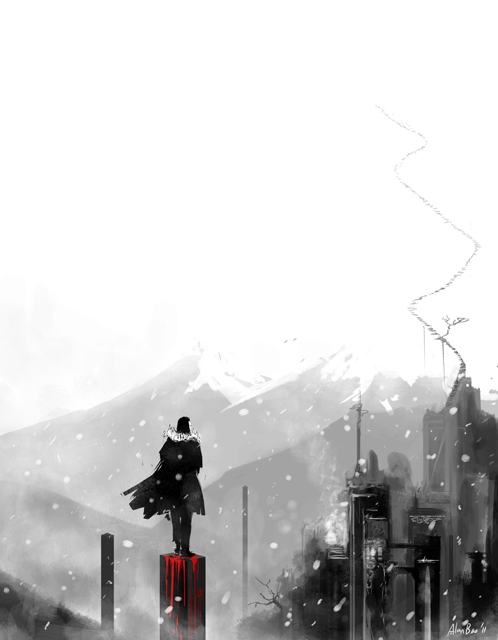
art by Alan Bao
Inflection
by Tina Connolly
Beth was breaking down book boxes in the backroom on the day he left. She ran her box cutter down taped seams, split the tape with slashing strokes that ran into the cardboard, ran through the corrugation, frayed bits of brown into fringe.
She had thought she would not see him again. Thought he would return to his home a billion miles away and never say goodbye. Leave her to her own decisions.
But there he stood at the door, the metal door that never locked properly, the one that had to be yanked into submission.
"This is it," he said, and, "It is it."
It aggravated her that even here at the end he couldn't fill in his pronouns. His language didn't, and so he wasn't used to it; he was used to a verbal sea of its and hims modified by gesture, scent, touch. "I am he," he had said when they met, and upon the word "he" had touched his shoulder with one brittle, blue-tinged hand. That meant his name.
Hand, Beth thought. Him. And she ripped the knife through the lines between the flaps, sharp and fast straight into the box. What right had he to possess something that looked like a hand, to identify with he? Alien should mean alien. Incongruous.
Incompatible.
He moved into the narrow workspace between the piles of empty boxes and the rack of returns of picture books that hadn't sold. The normal scent of him was sharp and alcoholic, like licorice, like anisette. "I'm going back there," he said, and lifted his sharp chin in a way that meant home.
Beth said nothing, but unhooked her knife from the box and ran it through another seam. When she compressed the box, a cardboard flap fell out of the bottom, dumping out a book that she had missed while receiving. A Hemingway collection. She turned it over in her hands.
"I just don't think there should be a record," he said, looking down at her. "That I was here."
"I see."
"And it can't possibly turn out. You know. Like it ought." A flex of his double jointed elbow, the released scent of sulphur--inflections that signified normal.
"Normal, no," she said. Of course it couldn't be. "And that's bad?"
"It's up to you, of course. But think of the difficulties it will have. Neither one thing or another. You see that, don't you?"
Beth had told him her name but he never used it. His name for her was "you," with a light touch on her chin. He did it now as he spoke, and the anisette of him curled along her skin. She did not know how he would describe her when he returned home, how he would represent she when she was not around to have her jaw line stroked.
Silent now, his brittle hands touched her hair, her neck, her jaw again. Without the spoken pronoun what did the touch on her chin mean to him? Half a language was an echo, perhaps, a whisper, voices dying in the distance.
"I could come with you," Beth said suddenly. It had been lurking in the back of her mind for three weeks now, but she hadn't dared to say it, only express it in hand and eye and tongue. A billion miles away. Away from everybody. The decision would be easy then, when she was fast in his arms, in flight from this life.
"It wouldn't work. Not among them," he said, and them was inflected with reverence, subordinance, personal shame. His hands left her face.
There seemed nothing else to say, so she held out the Hemingway so her hands had something to do. It was a best-of collection; the cover art showed white hills in a brown landscape. Hills like white elephants, she thought, and suddenly held it out to him. "You'd better take it," she said. "I've already reported it missing, and you'll need something to read."
"Long journey," he agreed, and touched her chin, whispering, "You." Then his oddly-jointed frame was by the door again, leaning out, ready to be gone. Out of her life, out of her atmosphere. "No record, right?"
Beth crushed the box she held against her rounded belly, in a way that might have said, I hate you for leaving, if they spoke the same kind of language, if her physicality meant something to him. "No record," she said.



